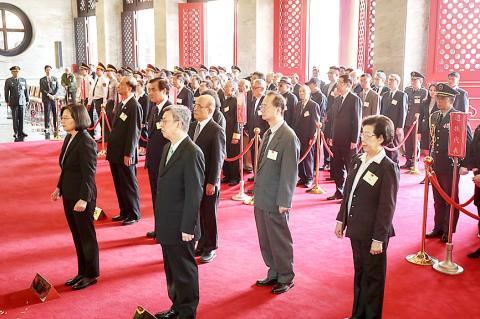Vice President Chen Chien-jen (陳建仁) yesterday announced that he would not be President Tsai Ing-wen’s (蔡英文) running mate in next year’s presidential election, adding that it was the “best decision” he could make for the president and the nation.
In an open letter on Facebook, Chen said that by next year he would have completed what he had signed up for when he agreed to join the Tsai administration almost four years ago.
To help the Democratic Progressive Party (DPP) remain in power, ensure the survival of Taiwan’s sovereignty and transform the economy, the party needs to unite to give Tsai its support, he said.

Photo: CNA
It has been a pleasure to take on the responsibility of reform, which has not been an easy path, but the criticism the DPP has faced in the more than three years since it won power were a necessary price to pay for reform, he said.
He entered politics to be the humblest of civil servants, so that Taiwan could become a better nation and people could have better lives, he added.
Chen said he hopes the public would cherish Tsai, who has always been “brave in doing the right thing,” and that the DPP would have the wisdom to make the correct decisions to keep Taiwan a free, democratic, prosperous and strong nation.
Although he would assume a different role, his thoughts would remain with the party, he said, adding that he had informed Tsai of his decision.
Chen’s announcement has reportedly raised anticipation among DPP members of a Tsai-Lai ticket, after former premier William Lai (賴清德) on Monday last week also registered for the party’s presidential primary.
Tsai, who also registered for the party’s primary last week, expressed her gratitude to Chen on Facebook, adding that she was impressed that his decision was made for the sake of party unity.
Several DPP lawmakers yesterday said the party has the best prospect of winning next year’s presidential election with a Tsai-Lai ticket.
DPP Legislator Chen Ming-wen (陳明文) said that Chen Chien-jen’s move paved the way for a Tsai-Lai ticket and applauded his decision at this “critical juncture.”
DPP Legislator Tsai Shih-ying (蔡適應) said that a Tsai-Chen Chien-jen ticket is not yet impossible, as the outcome would ultimately depend on the decision of each candidate.
DPP Legislator Wang Ting-yu (王定宇) praised Chen Chien-jen’s “selfless” move, saying that it was meant to facilitate coordination among the party’s presidential hopefuls.
However, DPP Legislator Kuo Kuo-wen (郭國文), who has openly expressed his support for Lai, said that Lai is unlikely to drop out of the primary, as he has a strong sense of responsibility and his supporters would not approve of such a move.

US President Donald Trump yesterday announced sweeping "reciprocal tariffs" on US trading partners, including a 32 percent tax on goods from Taiwan that is set to take effect on Wednesday. At a Rose Garden event, Trump declared a 10 percent baseline tax on imports from all countries, with the White House saying it would take effect on Saturday. Countries with larger trade surpluses with the US would face higher duties beginning on Wednesday, including Taiwan (32 percent), China (34 percent), Japan (24 percent), South Korea (25 percent), Vietnam (46 percent) and Thailand (36 percent). Canada and Mexico, the two largest US trading

AIR SUPPORT: The Ministry of National Defense thanked the US for the delivery, adding that it was an indicator of the White House’s commitment to the Taiwan Relations Act Deputy Minister of National Defense Po Horng-huei (柏鴻輝) and Representative to the US Alexander Yui on Friday attended a delivery ceremony for the first of Taiwan’s long-awaited 66 F-16C/D Block 70 jets at a Lockheed Martin Corp factory in Greenville, South Carolina. “We are so proud to be the global home of the F-16 and to support Taiwan’s air defense capabilities,” US Representative William Timmons wrote on X, alongside a photograph of Taiwanese and US officials at the event. The F-16C/D Block 70 jets Taiwan ordered have the same capabilities as aircraft that had been upgraded to F-16Vs. The batch of Lockheed Martin

GRIDLOCK: The National Fire Agency’s Special Search and Rescue team is on standby to travel to the countries to help out with the rescue effort A powerful earthquake rocked Myanmar and neighboring Thailand yesterday, killing at least three people in Bangkok and burying dozens when a high-rise building under construction collapsed. Footage shared on social media from Myanmar’s second-largest city showed widespread destruction, raising fears that many were trapped under the rubble or killed. The magnitude 7.7 earthquake, with an epicenter near Mandalay in Myanmar, struck at midday and was followed by a strong magnitude 6.4 aftershock. The extent of death, injury and destruction — especially in Myanmar, which is embroiled in a civil war and where information is tightly controlled at the best of times —

China's military today said it began joint army, navy and rocket force exercises around Taiwan to "serve as a stern warning and powerful deterrent against Taiwanese independence," calling President William Lai (賴清德) a "parasite." The exercises come after Lai called Beijing a "foreign hostile force" last month. More than 10 Chinese military ships approached close to Taiwan's 24 nautical mile (44.4km) contiguous zone this morning and Taiwan sent its own warships to respond, two senior Taiwanese officials said. Taiwan has not yet detected any live fire by the Chinese military so far, one of the officials said. The drills took place after US Secretary